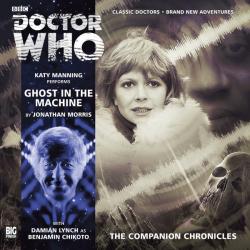Ghost in the Machine (Big Finish)
Tuesday, 19 November 2013 - Reviewed by

Ghost in the Machine
Produced by Big Finish
Written by Jonathan Morris
Directed by Louise Jameson
Released: October 2013
To make one matter abundantly clear, however, this is not Big Finish’s pièce de résistance of horror storytelling. Claims from some reviewers that Ghost in the Machine is the studio’s 2013 equivalent to Blink and Midnight are wildly off the mark. While there is effective atmospheric drama on display here, the script never reaches the benchmark of its predecessors for sheer fear factor. Indeed, the majority of the two-part drama’s tension dissipates in its second half; when the inevitable eventual presence of the show’s eponymous Time Lord ensures that the overall threat of Jo’s adversary seems minimal at best. Ghost’s antagonist certainly pales in comparison to the Weeping Angels and Russell T. Davies’ haunting, nameless Shadow, it has to be said.
Doubly infuriating is the recurrent sense that we’ve seen this all before. Although the classic series didn’t dabble quite so frequently with the potential meta-infused nature of televisual drama, at least not until its later days in instances such as Vengeance of Varos, this flirtation is practically the chalk and cheese of ‘new Who’. As such, a narrative involving voices manifested by and trapped on cassette records must ultimately be reminiscent of recent TV adventures, The Idiot’s Lantern, Silence in the Library and The Bells of Saint John all echoed in one way or another during this subtle adventure. Even the resolution feels as if ripped from the latter, the Third Doctor’s daring gambit hitting many of the same beats as the Eleventh Doctor’s turning the tables on Miss Kizlet earlier this year.
Thank the heavens, then, for Manning, whose work here should doubtless spark the immediate and prolonged engagement of any listener. It would be an impressive feat alone for the 1970s star to simply recapture the essence of her own character forty years on from her departure, yet she doesn’t stop there by any stretch, her portrayals of Pertwee’s Theta Sigma and the original foe of the drama equally as noteworthy, if not moreso. Few listeners would blame the Companion Chronicles contributors for becoming complacent as to their talents six years on from the range’s inception, so for Manning to move as far from resting on her laurels as humanly possible produces enriching results for any fan lucky enough to have experienced Jo Grant as she first appeared in 1971-1973.
If only Damian Lynch weren’t short-changed by the inherently unoriginal dialogue offered to his disembodied secondary narrator, then perhaps Ghost’s dynamic duo would have created a more well-rounded set of portrayals overall. Ultimately, Jonathan Morris’ script recalls this year’s Season Seven Part Two opener too visibly in its depiction of Lynch’s Benjamin Chikoto, a detrimental issue which in tandem with the gradually reduced tension restricts the release’s potential. Lynch’s failure to impress would be less surprising if newcomers to the Whoniverse showed a general trend of underwhelming performances at Big Finish, but fans only need to check out Jo Woodcock’s brilliant work in Starlight Robbery to discover that’s far from the case, another benchmark in which this potent drama falls oh-so-slightly short.
What does seem to reside as a trend of late in Big Finish’s Doctor Who releases is the sense that were some of their recent audio dramas to not have featured their accomplished central or supporting star(s), the lack of inspiration found in their narratives would leave plenty more to be desired. In the 50th Anniversary year, there’s little surprise in the studio’s election to revive revered adversaries like the Daleks, the Sontarans and the Master in Daleks Among Us, Starlight and The Light at the End respectively, but that accepted strategy simply cannot compensate for the disconcerting recognition that those stories lacking an iconic ‘classic’ element have been sorely lacking in the innovation department.
I refer once more to Steven Moffat’s election to have The Day of the Doctor focus primarily on setting up another fifty years of Doctor Who rather than simply nodding and winking towards the highlights of the last half century. In spite of the daunting audacity required to take such an approach, this reviewer would have applauded a greater confidence from Big Finish to take creative risks in what is a groundbreaking year of change for the show on screen. Ghost in the Machine is supported in great measure by Katy Manning’s superb contribution, yet for a studio which managed the impossible in aiding the strive to keep Who alive in the midst of its cancellation era, this is uncomfortably safe territory, an occasionally chilling but regularly familiar listen that holds scarce surprises for any initiated fan.







